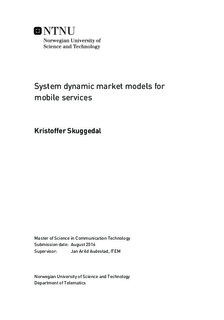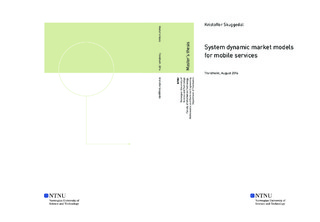| dc.description.abstract | The mobile service market has gone through a major change in the last several years. The market has evolved from a traditional monopolistic situation to a situation with a variety of different service providers. The competition in the mobile service market has grown at an exceptional rate in the past several years, and customers can now freely migrate form one service provider to another. With fewer new subscribers to sign up for mobile services, managing customer churn has become one of the most critical challenges for the mobile service providers. The focus has now switched from acquiring new customers to rather retaining existing ones. The aim of this paper is to study the competition between mobile service providers, and examine different types of churning behavior in order to predict the future of the market.
In particular, the study looks at what happens in the mobile service market when we have churning. Customer churning behavior plays an important role in the market, and in order to predict the future of the mobile service market, it is critical to understand what drives customers to churn. This study, investigates different churning determinates that affects the churning behavior. The research also includes network effects and word-of-mouth effect.
The study proposes a model, called the Competitive Mobile Service Model (CMSM), to model the competition between service providers in the mobile service market. The model is taking into account the adoption of new customers and churning between mobile service providers. The CMSM model was implemented in AnyLogic with system dynamics, and tested with three different scenarios to analyze the temporal evolution of the mobile service market.
The main findings in this study show that churning in the market matters, and the churning rate significantly affects the temporal evolution of adopters in the mobile service market. | |

